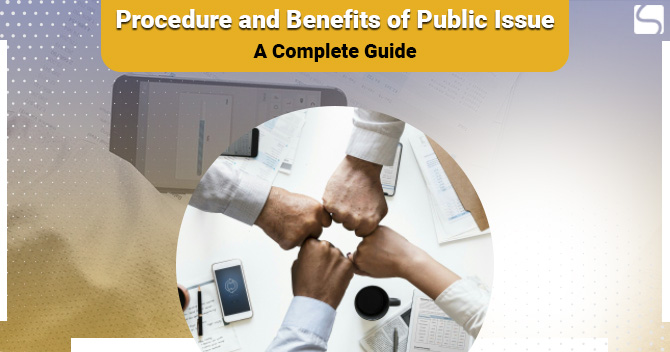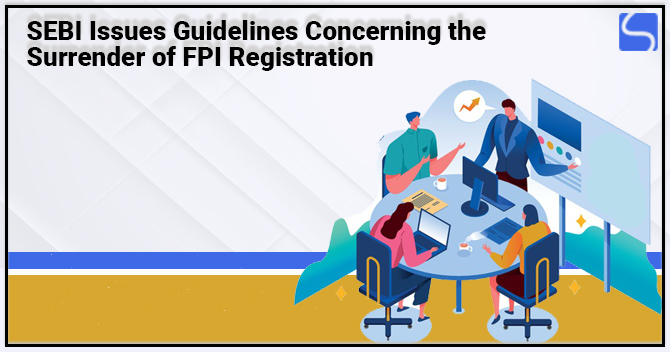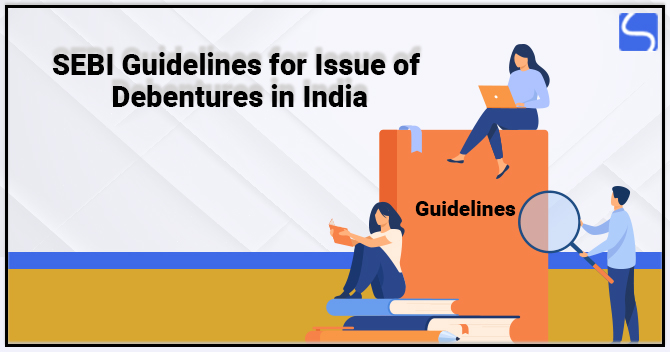Procedure and Benefits of Public Issue: A Complete Guide

Shivani Jain | Updated: Feb 18, 2021 | Category: Public Issue, SEBI Advisory
Nowadays, companies rely on various sources, such as Debentures, Financial Assistance from Banks and Financial Institutions, Public Issues, etc., to meet their day to day business affairs, operations, and working capital funds requirement. Further, the term fund requirements include both short term and long term requirements, and the same varies on the basis of the ongoing business project. However, it shall be considerate to take into consideration that out of all the forms available, the most chosen is Public Issue. The reason behind the same is the benefits and procedure of Public Issue.
In this blog, we will discuss about the benefits and procedure of Public Issue in India.
Table of Contents
Concept of Public Issue
The term “Public Issue” denotes the most prevalent form of raising funds from investors. Under this, a public limited company offers prospectus for inviting subscription from the general public. People who decide to subscribe shares need to pay an amount known as Share Application Money to the Company. Therefore, Public Issue means a mode of offering securities or convertible shares in the primary market to attract investors for the subscription.
Further, the different type of Public Issue are as follows:

- Initial Public Offer for Unlisted Company;
- Further Public Offer for Listed Company;
- Offer for Sale;
Also, Read: Difference between Public Issue and Private Placement
Concept of Initial Public Offer
Whenever an Unlisted Company offers its shares to the general public for subscriptions, the same is known as Initial Public Offer or IPO. Further, the term Unlisted Company means a company which has neither listed its share on any recognised stock exchange nor its shares are traded in any recognised stock exchange.
However, it shall be significant to take into consideration that the process of IPO is more risky than the process of FPO (Further Public Offer), as in this case, a company enters the market for the first time by way of issuing a prospectus.
Concept of Further Public Offer
Whenever a listed company issues its share for the second time in the market, the same is known as Further Public Offer. In layman terms, when a listed company comes out with a new issue of shares to the general public to increase its capital.
Under this process, the company which is issuing the shares has already got its shares listed and has duly complied with the process of Initial Public Offer. Therefore, the process of FPO is less risky than the process of IPO, as in the former case, investors are already well aware of the performance, reputation, and growth prospects of a company.
Concept of Offer for Sale
In the case of Offer for Sale, the shareholders of a company can offer a part of their shareholding to the general public in consultation with the Board of Directors. Further, the prospectus, by way of which shares are offered is known as LOI (Letter of Offer).
Also, it shall be considerate to take into consideration that the shareholders have the right to get their expense reimbursed concerning the offer. Therefore, the amount paid as a dividend or declared is directly paid to the transferee.
Benefits of Public Issue
The key benefits of Public Issue are as follows:
- No Need to Repay Capital, except in the case of Winding up;
- Does not prescribe any Fixed Rate of Interest;
- Facilitates Easy Transfer of Ownership;
- Provides more Liquidity;
- Enhances the Goodwill and Brand value of the Company;
Laws Governing the Process of Public Issues
The laws governing the process of Public Issues are as follows:
- Chapter 3, Part 1 of the Companies Act 2013[1];
- Securities Exchange Board of India (Issue of Capital and Disclosure Requirements) Regulations 2018;
- Securities Exchange Board of India (Listing Obligations and Disclosure Requirements) Regulations 2018;
- Securities Contracts (Regulations) Act 1956;
Conditions for Initial Public Offer
The conditions to be fulfilled for offering Initial Public Offer in India are as follows:
- The company must have net tangible assets of Rs 3 crores for the previous three financial years. 50% of these assets are known as Monetary Assets. However, if in case the company makes a public issue by way of Offer for Sale, then, in that case, the said the threshold of 50% will not be applicable;
- The said company must have earned a profit of Rs 15 crores in the previous three financial years out of the five financial years. Also, the profit in question must be the operating profit, i.e., PBT (Profit Before Tax) in nature;
- The unlisted company needs to have the net worth of at least Rs 1 crore in the previous three financial years;
- If in case a company decides to change its official name, then, in that case, at least 50% of the income earned in the preceding financial year must be from the new activity, i.e., in the new name;
- A company should not exceed its issue size more than five times of the total pre-issue net worth;
However, if in case the company does not fulfil the conditions stated above, then, in that case, the same can make an IPO by satisfying the conditions as follows:
- An issue can be made by way of the book building process by allotting at least 75% of the net offer to the Qualified Institutional Buyers (QIBs). But, if in case a company fails in the process as well, then, in that case, it needs to refund the amount received as subscription;
Duration of Initial Public Offer
The duration for the procedure of Public Issue, in the case of the Initial Public Offer, can be summarised as:
Fixed Price Issue
In this case, the offer remains open for a period of 3 to 10 working days;
Book Built Issue
In this case, the offer remains open for a period of 3 to 7 working days;
Right Issue
In this case, the offer remains open for a period of 15 to 30 working days;
Procedure of Public Issue: Initial Public Offer
The steps involved in the procedure of Public Issue, in the case of Initial Public Offer are as follows:
Choose an Investment Bank
For undergoing the procedure of public issue, a company needs to hire an investment bank for seeking advice. After that, an underwriting agreement will be signed between the parties involved. The same must lay down the details as follows:
- Total Number of Securities Issued;
- Prices of the Issued Securities;
Obtain Registration with SEBI
For applying for registration with SEBI, the company needs to file an application with the complete details of its Business Plan. Further, the same must provide the declaration concerning the utilisation of the capital raised by way of an IPO.
File Red Herring Prospectus
In the next step of the procedure of public issue, the directors of the company require to file an initial prospectus, together with the details concerning price estimation. The same is known as the Red Herring Prospectus, as it comprises of the warning that it is not the final prospectus.
Pricing of Initial Public Offer
It shall be considerate to note that SEBI plays no role in the pricing of shares. Also, it is the duty of the Issuer Company to consult with the appointed Investment Bank prior to fixing of the price. The prices fixed must be based on the prevailing market rates.
Further, the factors to be considered while determining the issue price are as follows:
- Employee Pension Scheme;
- Private Equity;
- Return on Net Worth;
Moreover, it shall be taken into consideration that a company is eligible to issue shares both by way of Fixed Price Issue or Book Built Issue.
In the former case, shares are issued based on fixed price, whereas, in the case of Book Built Method, the same are issued based on the price bracket within which an investor is able to bid.
Open Offer
A company is able to furnish the application form and prospectus both in online and offline mode, and the investors can get the same from any designated bank. Also, it is mandatory for the directors of the applicant company to furnish an application form, together with a cheque to the designated bank.
Completion of the Process of IPO
Once the company has decided the issue price, then, after that it needs to decide on the number of shares that an investor would get. However, it shall be taken into due consideration that the said company must ensure that the offer is fully subscribed and all the shares allotted are successfully credited the Dematerialised (DEMAT) account of the investors. Once the company has allotted the shares, it is ready to trade on the recognised stock exchange.
Conclusion
In a nutshell, in India, the maximum of companies tend to follow the procedure of Public Issue for raising funds from investors. The same can be bifurcated into three parts. Also, it shall be significant to state that the benefits of the public issue is the another reason for its prevalence in India.
Also, Read: How to Issue a Company Share Certificate?














